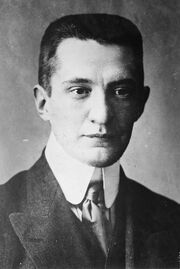| ||||||||||||||||||||||||||||||||
Alexander Fyodorovich Kerensky (Russian: Алекса́ндр Фёдорович Ке́ренский, IPA: [ɐlʲɪˈksandr ˈkʲerʲɪnskʲɪj]; 2 May 1881 – 11 June 1970) was a Russian lawyer and politician, who served as the second Minister-Chairman of the Russian Provisional Government in July–November 1917. A leader of the moderate-socialist Trudoviks faction of the Socialist Revolutionary Party, Kerensky is a key figure of the Russian Revolution.
After the February Revolution that deposed of Tsar Nicholas II, Kerensky served as Minister of Justice in Georgy Lvov's post-imperial and democratic Provisional Government. In May he became Minister of War. In July he succeeded Lvov as Minister-Chairman. On 7 November, his government was overthrown by Bolsheviks, led by Vladimir Lenin in the October Revolution. He spent the remainder of his life in exile, dying in New York City at the age of 89.
Alexander Kerensky in Joe Steele[]
Despite the strong hatred that U.S. President Joe Steele felt for Soviet leader Leon Trotsky, Steele perceived Alexander Kerensky, who was in exile in Paris, as little more than a joke.[1] Even after Kerensky fled Paris in advance of the German invasion in 1940, and relocated to New York City, the Steele Administration paid no attention to Kerensky, despite the fact that the U.S. had not yet officially recognized the U.S.S.R.[2]
References[]
- ↑ Joe Steele, pg. 202, HC.
- ↑ Ibid., pg. 239.
| Political offices (OTL) | ||
|---|---|---|
| Preceded by Georgy Lvov |
Minister-Chairman (head of state and government) of the Russian Provisional Government 21 July 1917 – 8 November 1917 |
Succeeded by Vladimir Lenin (Chairman of the Council of People's Commissars) Lev Kamenev (Chairman of the All-Russian Central Executive Committee) |
| |||||||||||||||||||

